英语代词教案讲义
小学英语语法《代词》教案

《代词》教案一、教学目标1.熟练掌握人称代词、物主代词的基本形式及用法2.熟练掌握指示代词的基本用法3.了解反身代词的基本用法二、本节知识结构图人称代词:主格,宾格物主代词:形容词性物主代词,名词性物主代词反身代词指示代词三、教学过程一、人称代词(一)定义:指代“人”或“物”1.做主语例:I like table tennis.我喜欢兵乓球。
He is playing basketball.他正在打篮球。
2.做宾语例:Do you know him?你认识他吗? She is clever than me.她比我聪明。
二、物主代词(一)定义:表示某人或某物属于“谁的”(二)分类1.形容词性物主代词1.形容词性物主代词的作用相当于形容词,在句子中作定语,后面必须跟名词。
例:His desk is broken.他的桌子坏了。
Her English book is over here.她的英语书在这里。
2.名词性物主代词的作用相当于名词,可作主语和宾语A.做主语:例:Our school is here; theirs is there.我们的学校在这里;他们的在那里。
That isn’t my car; mine is being repaired.这不是我的车;我的正在修理。
B.做宾语例:This is your English book.这本书是你的。
This green bike is hers.这辆绿色的自行车是她的。
三、反身代词(一)定义:表示“自己”,“我自己”“你自己”“他/她/它自己”“我们自己”“你们自己”“他/她/它们自己”I can do it myself.2、We enjoyed ourselves at the party yesterday.我们昨天玩的很开心。
初中代词的优秀教案英语

初中代词的优秀教案英语一、教学目标1. 让学生掌握人称代词和物主代词的用法,包括主格、宾格和所有格形式。
2. 培养学生正确使用代词进行表达的能力,提高口语交际水平。
3. 引导学生通过练习和实际应用,深化对代词的理解和运用。
二、教学内容1. 人称代词:I, you, he, she, it, we, they及其主格、宾格和所有格形式。
2. 物主代词:my, your, his, her, its, our, their及其对应的形容词形式。
三、教学重点与难点1. 重点:人称代词和物主代词的各种形式及用法。
2. 难点:人称代词和物主代词在特定语境中的正确运用。
四、教学方法1. 情境教学法:通过设定各种生活情境,让学生在实际语境中学习和运用代词。
2. 互动教学法:引导学生进行小组讨论和角色扮演,提高口语交际能力。
3. 任务型教学法:设计各种任务,让学生在完成任务的过程中运用代词。
五、教学步骤Step 1: 导入(5分钟)1. 老师向学生提问:“Can you guess who is coming to our class today?”引导学生猜测并引入新课。
2. 学生回答后,老师揭示答案:“It's our new classmate, Tom.”然后板书课题:“Personal Pronouns and Possessive Pronouns”。
Step 2: 讲解(15分钟)1. 老师分别讲解人称代词和物主代词的各种形式及用法,让学生注意主格、宾格和所有格的差别。
2. 老师通过示例,讲解人称代词和物主代词在句子中的位置和作用。
Step 3: 练习(15分钟)1. 老师给出各种练习题,让学生填空或选择正确的人称代词和物主代词。
2. 学生独立完成练习,老师巡回指导并解答疑问。
Step 4: 互动环节(15分钟)1. 老师组织学生进行小组讨论,讨论如何在实际语境中正确使用人称代词和物主代词。
初中英语代词教案

初中英语代词教案教案主题:初中英语代词教学目标:1.理解代词的定义与作用;2.掌握常见的代词及其用法;3.进一步提高学生的英语阅读和写作能力。
教学重点:1.加深学生对代词的理解;2.学会正确运用代词。
教学难点:学生能够正确运用各种代词进行口头表达和书面表达。
教学准备:1.教师准备:PPT、单词卡片、课件;2.学生准备:课本。
教学流程:Step 1:导入(5分钟)出示单词卡片,让学生根据图片或示例,猜测单词的意思,并补充相关的代词。
Step 2:知识讲解(10分钟)讲解代词的定义和作用,并列举常见的代词。
重点讲解人称代词、物主代词、指示代词和不定代词的用法。
Step 3:练习(15分钟)1.随堂小练:根据句子意思,选择恰当的代词填空。
2.完成课本上的代词练习。
Step 4:扩展训练(15分钟)要求学生以小组为单位,选取一篇短文进行阅读,并用代词替换出现的名词或名词短语。
最后交流、分享答案。
Step 5:巩固与拓展(10分钟)教师指导学生完成一些小组活动,如对话或写作,要求学生使用代词进行交流和表达。
Step 6:课堂总结(5分钟)总结本节课所学的代词知识,并强调重点和难点。
Step 7:作业布置(5分钟)要求学生预习下一课的内容,并完成相应的练习。
Step 8:课堂点评(5分钟)对学生的表现给予点评,并提出改进建议。
教学反思:本节课通过导入、知识讲解、练习、扩展训练等环节,使学生逐渐掌握代词的使用方法,并能够运用代词进行交流和表达。
需要注意的是,教师应引导学生灵活运用代词,并鼓励他们在口语和写作中多多使用代词,提高语言表达能力。
怎么讲解代词英语课程教案
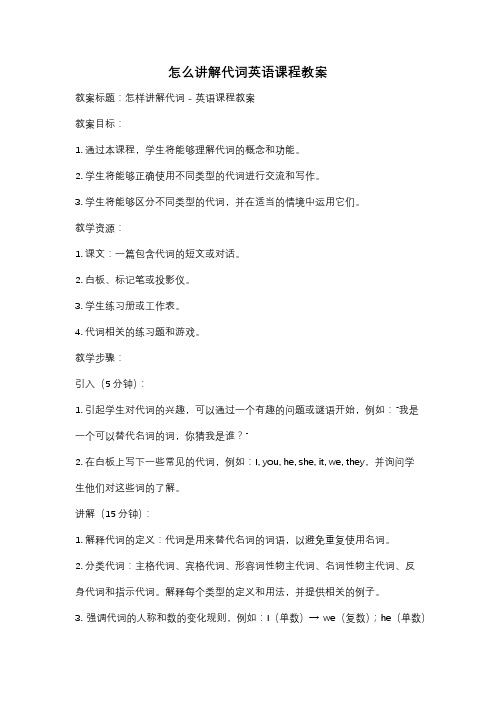
怎么讲解代词英语课程教案教案标题:怎样讲解代词 - 英语课程教案教案目标:1. 通过本课程,学生将能够理解代词的概念和功能。
2. 学生将能够正确使用不同类型的代词进行交流和写作。
3. 学生将能够区分不同类型的代词,并在适当的情境中运用它们。
教学资源:1. 课文:一篇包含代词的短文或对话。
2. 白板、标记笔或投影仪。
3. 学生练习册或工作表。
4. 代词相关的练习题和游戏。
教学步骤:引入(5分钟):1. 引起学生对代词的兴趣,可以通过一个有趣的问题或谜语开始,例如:“我是一个可以替代名词的词,你猜我是谁?”2. 在白板上写下一些常见的代词,例如:I, you, he, she, it, we, they,并询问学生他们对这些词的了解。
讲解(15分钟):1. 解释代词的定义:代词是用来替代名词的词语,以避免重复使用名词。
2. 分类代词:主格代词、宾格代词、形容词性物主代词、名词性物主代词、反身代词和指示代词。
解释每个类型的定义和用法,并提供相关的例子。
3. 强调代词的人称和数的变化规则,例如:I(单数)→ we(复数);he(单数)→ they(复数)等。
示范(10分钟):1. 使用一个简短的对话或故事来展示代词的使用。
确保对话或故事中包含不同类型的代词,并提醒学生注意这些代词的用法和位置。
2. 逐句解释对话或故事中的代词,并鼓励学生跟读和模仿。
练习(15分钟):1. 分发学生练习册或工作表,让学生完成填空、选择或改写句子的练习,以巩固对代词的理解和运用。
2. 设计一些口头练习,例如:学生之间进行问答,使用代词来回答问题,或者进行小组活动,让学生编写对话并使用代词进行交流。
总结(5分钟):1. 回顾本课程的核心内容,强调代词的定义和不同类型的用法。
2. 鼓励学生在日常生活和写作中积极运用代词,以提高他们的语言表达能力。
拓展活动:1. 分组进行代词游戏,例如:学生之间互相提问并使用代词回答问题。
2. 鼓励学生阅读包含代词的文章或故事,并要求他们在阅读后总结出文章中使用的代词类型和功能。
(完整版)初中英语代词教案
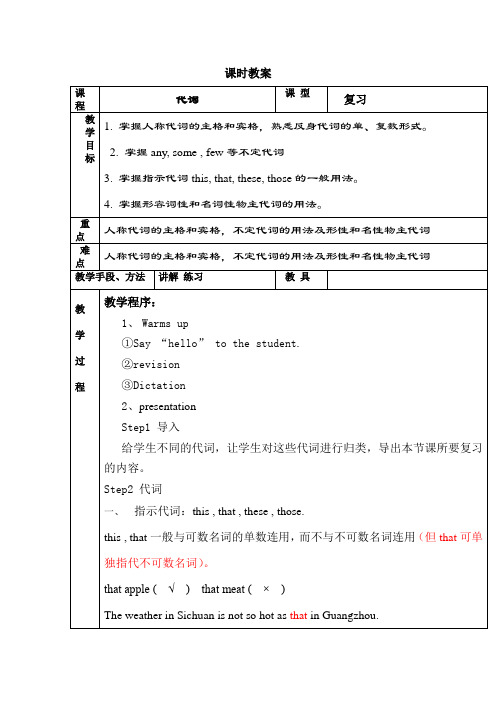
4.(all) by oneself(完全)独立地
5.help oneself to请自便;随便吃…
6.look after oneself自理;照顾自己
7.leave one by oneself把…单独留下
8.lose oneself in陶醉于…;沉浸于…
三、不定代词
1)some与any的用法
Step2代词
一、指示代词:this , that , these , those.
this , that一般与可数名词的单数连用,而不与不可数名词连用(但that可单独指代不可数名词)。
that apple ( √ ) that meat ( × )
The weather inSichuanis not so hot asthatinGuangzhou.
①.____ student in the class likes English.
②.___ of the students studied hard.
代词 初中教案
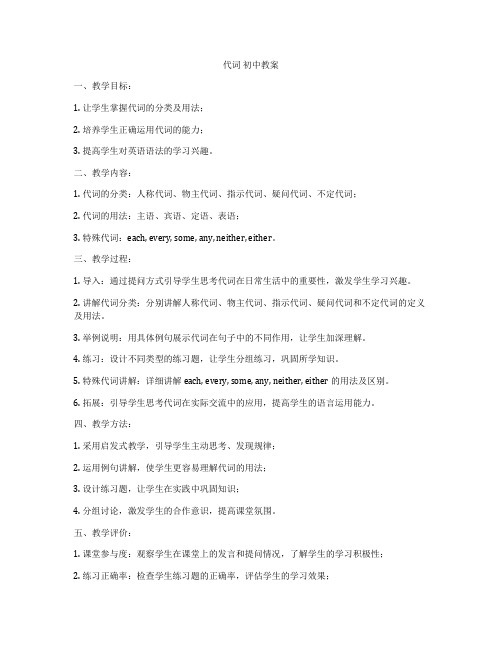
代词初中教案一、教学目标:1. 让学生掌握代词的分类及用法;2. 培养学生正确运用代词的能力;3. 提高学生对英语语法的学习兴趣。
二、教学内容:1. 代词的分类:人称代词、物主代词、指示代词、疑问代词、不定代词;2. 代词的用法:主语、宾语、定语、表语;3. 特殊代词:each, every, some, any, neither, either。
三、教学过程:1. 导入:通过提问方式引导学生思考代词在日常生活中的重要性,激发学生学习兴趣。
2. 讲解代词分类:分别讲解人称代词、物主代词、指示代词、疑问代词和不定代词的定义及用法。
3. 举例说明:用具体例句展示代词在句子中的不同作用,让学生加深理解。
4. 练习:设计不同类型的练习题,让学生分组练习,巩固所学知识。
5. 特殊代词讲解:详细讲解each, every, some, any, neither, either的用法及区别。
6. 拓展:引导学生思考代词在实际交流中的应用,提高学生的语言运用能力。
四、教学方法:1. 采用启发式教学,引导学生主动思考、发现规律;2. 运用例句讲解,使学生更容易理解代词的用法;3. 设计练习题,让学生在实践中巩固知识;4. 分组讨论,激发学生的合作意识,提高课堂氛围。
五、教学评价:1. 课堂参与度:观察学生在课堂上的发言和提问情况,了解学生的学习积极性;2. 练习正确率:检查学生练习题的正确率,评估学生的学习效果;3. 课后作业:布置相关作业,要求学生在课后巩固所学知识,提高自学能力。
六、教学总结:通过本节课的学习,使学生掌握代词的分类、用法及特殊代词的区别,培养学生正确运用代词的能力。
在教学过程中,注重启发式教学,让学生在实践中学会运用代词,提高学生的英语语法水平。
同时,激发学生对英语语法的学习兴趣,为后续课程打下坚实基础。
英语代词教案讲义
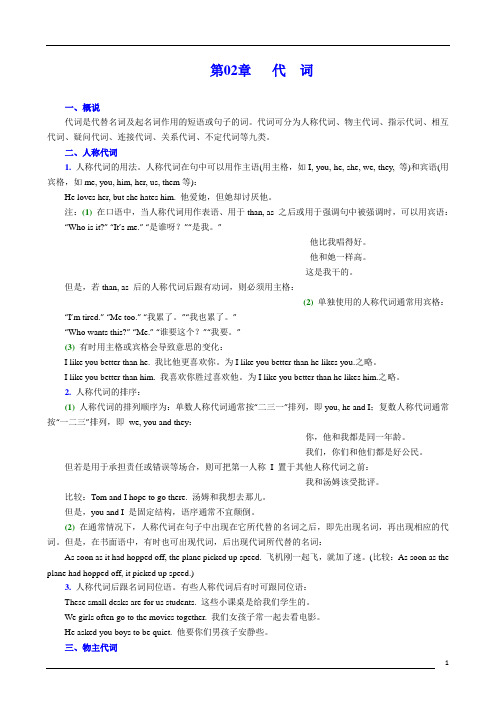
第02章代词一、概说代词是代替名词及起名词作用的短语或句子的词。
代词可分为人称代词、物主代词、指示代词、相互代词、疑问代词、连接代词、关系代词、不定代词等九类。
二、人称代词1.人称代词的用法。
人称代词在句中可以用作主语(用主格,如I, you, he, she, we, they, 等)和宾语(用宾格,如me, you, him, her, us, them等):He loves her, but she hates him. 他爱她,但她却讨厌他。
注:(1)在口语中,当人称代词用作表语、用于than, as 之后或用于强调句中被强调时,可以用宾语:“Who is it?”“It’s me.”“是谁呀?”“是我。
”______________________________________________________ 他比我唱得好。
______________________________________________________ 他和她一样高。
______________________________________________________ 这是我干的。
但是,若than, as 后的人称代词后跟有动词,则必须用主格:______________________________________________________ (2)单独使用的人称代词通常用宾格:“I’m tired.”“Me too.”“我累了。
”“我也累了。
”“Who wants this?”“Me.”“谁要这个?”“我要。
”(3)有时用主格或宾格会导致意思的变化:I like you better than he. 我比他更喜欢你。
为I like you better than he likes you.之略。
I like you better than him. 我喜欢你胜过喜欢他。
为I like you better than he likes him.之略。
初中英语代词教案
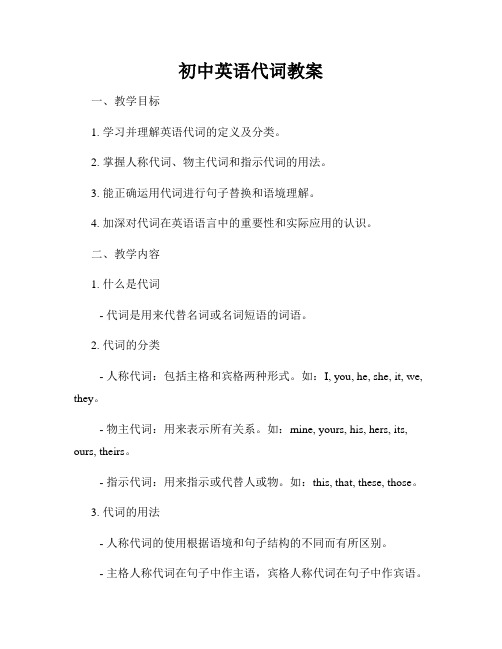
初中英语代词教案一、教学目标1. 学习并理解英语代词的定义及分类。
2. 掌握人称代词、物主代词和指示代词的用法。
3. 能正确运用代词进行句子替换和语境理解。
4. 加深对代词在英语语言中的重要性和实际应用的认识。
二、教学内容1. 什么是代词- 代词是用来代替名词或名词短语的词语。
2. 代词的分类- 人称代词:包括主格和宾格两种形式。
如:I, you, he, she, it, we, they。
- 物主代词:用来表示所有关系。
如:mine, yours, his, hers, its, ours, theirs。
- 指示代词:用来指示或代替人或物。
如:this, that, these, those。
3. 代词的用法- 人称代词的使用根据语境和句子结构的不同而有所区别。
- 主格人称代词在句子中作主语,宾格人称代词在句子中作宾语。
- 物主代词用来表示所属关系,放在名词前。
4. 代词的句子替换- 代词在句子中可以替代特定的名词或名词短语,使句子更加简洁明了。
- 通过使用代词,可以避免重复使用同一个名词,提高语言表达的效果。
三、教学过程1. 引入新知识- 教师向学生解释代词的概念和作用,引导学生思考代词的使用场景。
2. 学习人称代词- 教师逐一介绍人称代词的主格和宾格形式,并给出示例句子进行讲解。
3. 学习物主代词- 教师讲解物主代词的用法,并提供相关例句进行练习。
4. 学习指示代词- 教师介绍指示代词的使用场景和具体示范,让学生从中感受指示代词的功能。
5. 综合练习- 教师设计各种实际情境,提供句子并让学生使用适当的代词进行替换。
6. 总结归纳- 教师带领学生总结整个教学内容,检查学生对代词的掌握情况。
四、教学评价1. 口头评价- 教师随堂评价学生的参与度、表达能力和理解程度。
2. 书面评价- 教师布置相关作业,通过作业的完成情况评价学生对代词的灵活运用能力。
五、教学延伸1. 扩展练习- 学生可以观察周围环境,找出更多的句子并运用代词进行替换。
- 1、下载文档前请自行甄别文档内容的完整性,平台不提供额外的编辑、内容补充、找答案等附加服务。
- 2、"仅部分预览"的文档,不可在线预览部分如存在完整性等问题,可反馈申请退款(可完整预览的文档不适用该条件!)。
- 3、如文档侵犯您的权益,请联系客服反馈,我们会尽快为您处理(人工客服工作时间:9:00-18:30)。
第02章代词一、概说代词是代替名词及起名词作用的短语或句子的词。
代词可分为人称代词、物主代词、指示代词、相互代词、疑问代词、连接代词、关系代词、不定代词等九类。
二、人称代词1.人称代词的用法。
人称代词在句中可以用作主语(用主格,如I, you, he, she, we, they, 等)和宾语(用宾格,如me, you, him, her, us, them等):He loves her, but she hates him. 他爱她,但她却讨厌他。
注:(1)在口语中,当人称代词用作表语、用于than, as 之后或用于强调句中被强调时,可以用宾语:“Who is it?”“It’s me.”“是谁呀?”“是我。
”______________________________________________________ 他比我唱得好。
______________________________________________________ 他和她一样高。
______________________________________________________ 这是我干的。
但是,若than, as 后的人称代词后跟有动词,则必须用主格:______________________________________________________ (2)单独使用的人称代词通常用宾格:“I’m tired.”“Me too.”“我累了。
”“我也累了。
”“Who wants this?”“Me.”“谁要这个?”“我要。
”(3)有时用主格或宾格会导致意思的变化:I like you better than he. 我比他更喜欢你。
为I like you better than he likes you.之略。
I like you better than him. 我喜欢你胜过喜欢他。
为I like you better than he likes him.之略。
2.人称代词的排序:(1)人称代词的排列顺序为:单数人称代词通常按“二三一”排列,即you, he and I;复数人称代词通常按“一二三”排列,即we, you and they:______________________________________________________ 你,他和我都是同一年龄。
______________________________________________________ 我们,你们和他们都是好公民。
但若是用于承担责任或错误等场合,则可把第一人称I 置于其他人称代词之前:______________________________________________________ 我和汤姆该受批评。
比较:Tom and I hope to go there. 汤姆和我想去那儿。
但是,you and I 是固定结构,语序通常不宜颠倒。
(2)在通常情况下,人称代词在句子中出现在它所代替的名词之后,即先出现名词,再出现相应的代词。
但是,在书面语中,有时也可出现代词,后出现代词所代替的名词:As soon as it had hopped off, the plane picked up speed. 飞机刚一起飞,就加了速。
(比较:As soon as the plane had hopped off, it picked up speed.)3.人称代词后跟名词同位语。
有些人称代词后有时可跟同位语:These small desks are for us students. 这些小课桌是给我们学生的。
We girls often go to the movies together. 我们女孩子常一起去看电影。
He asked you boys to be quiet. 他要你们男孩子安静些。
三、物主代词1.物主代词的用法。
物主代词分形容词性物主代词(my, your, his, her, its, our, your, their)和名词性物主代词(mine, yours, his, hers, its, ours, yours, theirs)。
形容词性物主代词在句只用作定语;名词性物主代词则不能用作定语,但可以用作主语、宾语、表语、连用of作定语:His son is taller than hers. 他的儿子比她的儿子高。
Her son is a friend of ours. 她的儿子是我们的朋友。
Ours is a great country. 我们的国家是一个伟大的国家This is your pen. Mine is in the box. 这是你的铅笔,我的在铅笔盒里。
注:可以说 a friend of mine (ours, yours, hers, his, theirs),但是不能说a friend of me (us, you, her, him, theirs),但是“名词+of it”有时可用来代替“its+名词”,如its price 也可说成the price of it。
2.物主代词与own 连用。
为了强调,有时可在物主代词后加上own一词:Mind your own business. 别管闲事。
I saw it with my own eyes. 那是我亲眼看到的。
有可用of one’s own 置于名词后作定语:I hope to have a room of my own. / I hope to have my own house. 我希望有自己的房子。
3.使用物主代词注意点和易错点:(1)要注意英语与汉语使用物主代词的差异。
汉语说“我校”,说成英语应是my school,而不能是I school;汉语说“他妈”,说成英语应是his mother,而不能是he mother;同样地,汉语说“你先生”,说成英语应是your husband,而不能是you husband。
另外,有些在英语中必用的物主代词在汉语中往往无需表达,如:听到这个消息,他摇了摇头。
误:Hearing the news he shook head.正:______________________汉语通常只说“摇头”,不说“摇某人的头”,而英语则说shake one’s head。
(2)有时按汉语习惯似乎应用物主代词,而英语却要用人称代词:这个学期谁教我们的英语?误:Who will teach our English this term?正:______________________________________________________English 作为一个表示语言的名词,其前不能用物主代词,除非它表示的是使用英语的水平或能力,如可说My English is poor. 我的英语(水平)不行。
类似地,不能说He teaches my physics,但可以说My physics is good。
(3)不要受相似结构和短语的影响而用错物主代词。
如lose heart 与lose one’s heart,两者仅差一个物主代词,意思截然不同:前者意为“灰心”、“泄气”;后者意为“爱上”、“钟情于”;又如have…on one's mind(为…担忧,把…挂在心上)与keep[bear]…in mind(记住…,把…记在心里),两者结构相似,但一个用物主代词,一个不用物主代词。
四、反身代词1.反身代词的基本形式。
反身代词是oneself根据所指词的人称、性别、单复数等的变化可以有myself, himself, herself, yourself, itself, ourselves, yourselves, themselves 等形式。
2. oneself与himself。
当one指人时,其相应的反身代词通常用oneself, 在美国英语中也可用himself:One should not praise oneself [himself]. 一个人不应该自吹自擂。
3.反身代词的句法功能:(1)用作同位语(加强被修饰词的语气,紧放在被修饰名词后, 或句末):The box itself is not so heavy. 箱子本身并不重。
Y ou yourself said so. / Y ou said so yourself. 你自己是这样说的。
(2)用作宾语(动词或介词的宾语):Take good care of yourself. 照顾好自己。
She could not make herself understood. 她不能使别人听懂她的话。
(3)用作表语:The poor boy was myself. 那个可怜的孩子就是我自己。
The ones who really want it are ourselves. 真正想要它的是我们自己。
有时用于be, feel, seem, look 等后作表语表示身体或精神处于正常状态:I'm not quite myself these days. 我近来身体不大舒服。
I'll be myself again in no time. 我过一会儿就会好的。
(4)用作主语。
在现代英语中,反身代词一般不能独立用作主语,但是它却可以借助and, or, nor 等连词与其他名词一起构成并列主语(且位于并列主语的后部),以及用于某些特殊结构(如as...as等):My brother and myself went there yesterday. 昨天我兄弟和我一起去了那儿。
Jim's sister and himself get up at six every day. 吉姆的妹妹和他每天6点起床。
He was as anxious as myself. 他和我一样担心。
五、相互代词1.相互代词的形式与用法。
英语的相互代词只有each other和one another,它们在句中通常只用作宾语:We should help each other. 我们应该互相帮助。
They respect one another. 他们互相尊重(对方)。
The sea and the sky seem to melt into each other. 大海和蓝天似乎融为一体。
2.使用相互代词注意点:(1)相互代词在句中通常只用作宾语,不可用作主语,所以以相互代词为宾语的句子不能变为被动语态。
(2)不要将相互代词误认为是副词,将其用作状语,如可说talk to each other,但不能说talk each other。
